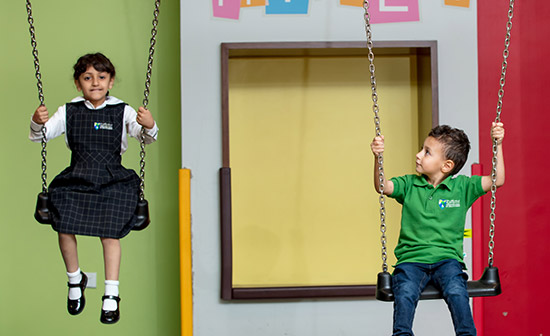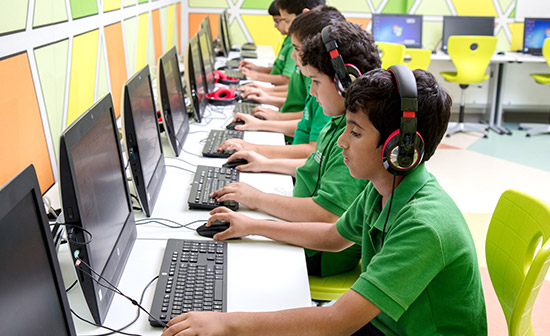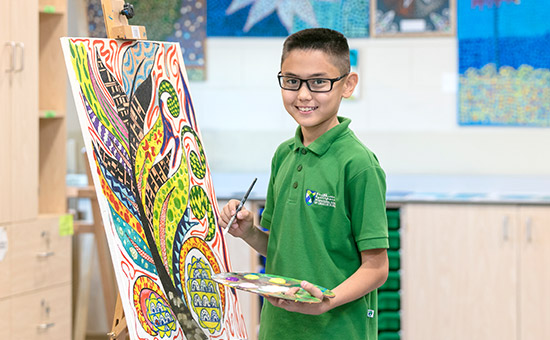Nurturing Academic Excellence through the England National Curriculum blended with the Bahrain MOE curriculum for Arabic Language, Islamic Education, and Citizenship
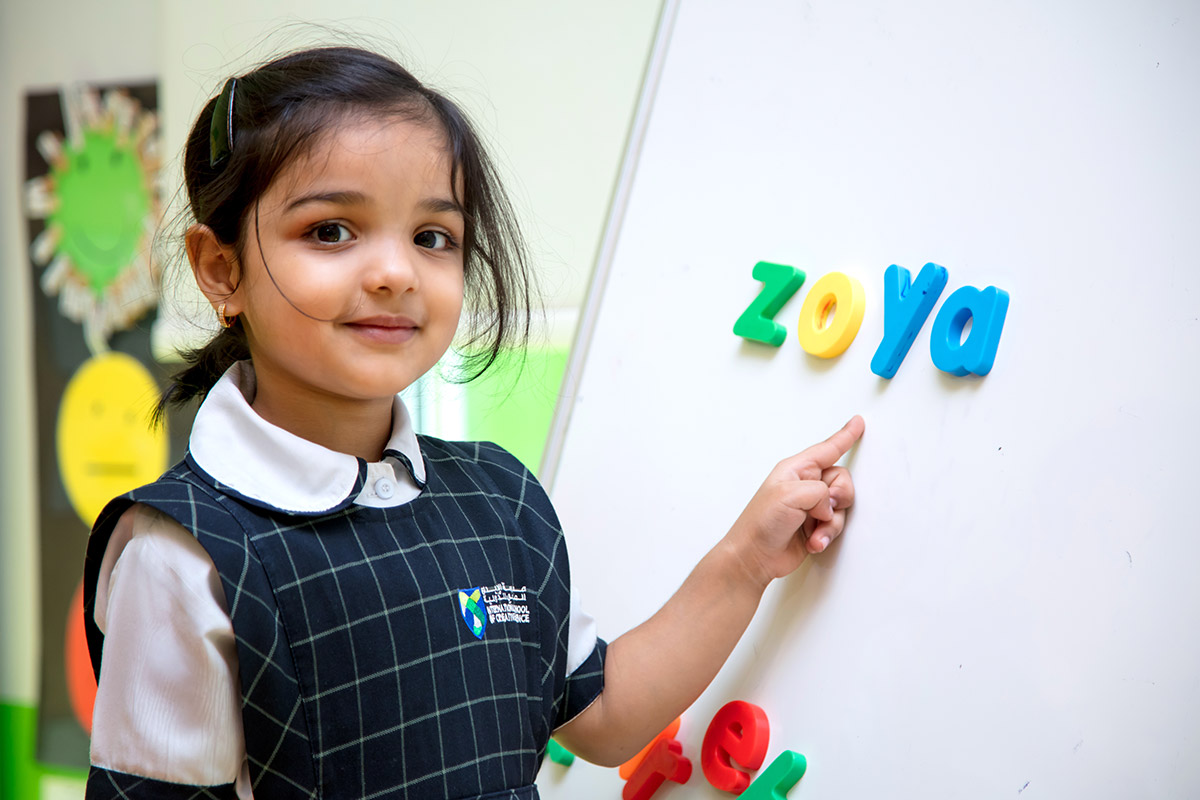
At ISCS, we proudly implement the UK curriculum, drawing inspiration from the esteemed National Curriculum of England. The progression of the curriculum forms the backbone of our teaching methodology, ensuring that students receive a world-class education that aligns with international standards of excellence. Through this curriculum, we aim to empower learners with a comprehensive and globally recognised foundation, equipping them with the knowledge, skills, and mindset needed to thrive in an increasingly interconnected world. ISCS Bahrain will offer the Bahrain MOE curriculum for Arabic Language, Islamic Education, and Citizenship.
Overview of UK Curriculum
At ISCS, our curriculum is meticulously designed around the National Curriculum for England framework. The Senior Leadership Team has taken great care to ensure comprehensive coverage, including aspects beyond the dimensions of curriculum, in a structured and progressive manner throughout the school. Subject leaders have further detailed the knowledge and skills for each subject, ensuring a smooth transition from one stage of learning to the next.
Embracing a thematic and holistic approach, each class embarks on a new topic every half term, serving as the focal point for curriculum delivery. These topics are thoughtfully chosen based on considerations such as the ENC Curriculum, our local context, and our cherished school values. Foundation subjects are integrated to ensure balanced coverage and bolster long-term memory development.
We firmly believe that teaching through engaging topics brings learning to life, enhancing its relevance and memorability for our students. This approach aligns perfectly with our context and school values, providing children with enriching experiences that broaden their horizons and deepen their cultural knowledge. Our curriculum is rooted in knowledge and skills, with the goal of nurturing independent learners who can adeptly apply this knowledge, complemented by the skills acquired along their educational journey, to real-world context.
Whole School Curriculum Intent
Our curriculum is meticulously designed to cultivate resilient, well-rounded learners, equipping them with the knowledge, understanding, and skills needed to become responsible, impactful members of both local and global communities. Guided by a moral compass rooted in faith, our aim is to effect positive transformations in the lives of our students.
Empowering Confident Global Citizens
We envision our learners as confident, courageous global citizens whose voices are heard. They are prepared to confront any obstacles that may hinder the pursuit of their ambitions. Our curriculum is designed to inspire, support, and include, aligning with the UK National Curriculum, Bahrain Ministry of Education curriculum, and specially tailored holistic learning experiences that reflect our international context. This journey starts from each student's unique starting point and leads them towards a platform for success in higher education and the professional world.
Responsive and Aspirational
Our curriculum is dynamic, adapting to our diverse and ever-evolving context. We hold high aspirations at the heart of our educational intent, aiming to foster academic excellence deeply rooted in core values.
Empowering through Comprehensive Skill Sets
Our curriculum is crafted to support our learners' diverse needs, focusing not only on subject concepts but also on the development of essential personal skills and virtues. These skills, such as compassion, integrity, tolerance, courage, collaboration, responsibility, reasoning, reflection, resilience, and resourcefulness, are crucial for students to become well-rounded individuals capable of independent thinking, facing challenges, and leading with others.
Equipping for the Future
To prepare our students for success in the workplace, our curriculum hones a range of employability skills including collaboration, creativity, problem-solving, critical thinking, leadership, global citizenship, growth mindset, and effective communication.
Foundations: Literacy, Numeracy, and Oracy
Literacy and numeracy are fundamental cornerstones across our curriculum, empowering students to unlock their potential and engage with the world. Additionally, the development of effective oral communication (oracy) is integral to our regional culture, enhancing students' ability to articulate their thoughts and ideas confidently.
Beyond the Classroom: Extra-Curricular Enrichment
We believe that learning transcends the confines of classrooms. Our extra-curricular activities, linked to subject concepts and beyond, serve to enrich the learning experience. These opportunities are crafted to bolster and enhance our students' educational journey, providing them with positive and memorable experiences beyond traditional lessons.
Curriculum Aims:
The aims of our school curriculum are
- To fulfil all the requirements of the National Curriculum and the required Ministry of Education Curriculum of Arabic, Islamic Education , History and Geography.
- To provide a knowledge-rich curriculum, where children remember what they have learned.
- To provide enriching opportunities and experiences to promote cultural capital.
- To provide a broad curriculum in order to increase children’s knowledge.
- To provide a spiral curriculum, with opportunities to revisit prior learning and encourage deep learning.
- To provide children with a progressive curriculum, with explicit links with what the new learning builds on from and leads on to.
- To enable all children to understand that they are all successful learners.
- To enable children to understand the skills and attributes needed to be a successful learner.
- To encourage children to build a resilient attitude towards learning and challenge.
- To enable children to develop their own personal interests.
- To promote a positive attitude towards learning, so that children enjoy coming to school, and acquire a solid basis for lifelong learning.
- To teach children the basic skills of literacy, numeracy, and information technology (IT).
- To encourage a love for reading and to promote reading through all areas of the curriculum.
- To enable children to be creative through art, drama, and design technology.
- To enable children to be healthy individuals who enjoy sport and appreciate the importance of a healthy lifestyle.
- To teach children about their developing world, including how their environment and society have changed over time.
- To help children understand their local heritage and cultural heritage.
- To enable children to be positive citizens in society and to feel that they can make a difference.
- To enable children to understand and respect other cultures.
- To teach children to have an awareness of their own spiritual development, and to understand right from wrong.
- To help children understand the importance of truth and fairness, so that they grow up committed to equal opportunities for all.
- To enable children to have respect for themselves and high self-esteem, and to be able to live and work cooperatively with others.
- To enable children to be active and take responsibility for their own health.
- To enable children to be passionate about what they believe in and to develop their own thinking
- To enable children to ask questions and take risks.
Students will be educated to the highest standards in a warm, friendly, secure and conservative environment. The environmental conditions to learning are further achieved by the school's healthy and balanced emphasis on discipline and fostering respect by all, for all.
Early Years Provision at ISCS Bahrain; building strong foundations.

Our curriculum encompasses seven total areas of learning and development. All areas of learning and development are important and are interconnected.
The first three areas are particularly important for building a strong foundation of igniting children’s curiosity and enthusiasm for learning, forming relationships, and thriving. These are called the prime areas:
- Communication and language
- Physical development
- Personal, social, and emotional development
The next four areas help children strengthen and apply the prime areas. These are called the specific areas:
- Literacy
- Mathematics
- Understanding the world
- Expressive arts and design
At ISCS, we are committed to offering children the best start to their education through a mixture of adult directed tasks and child-initiated learning.
Through the areas of provision, we aim to spark curiosity and investigation to move learning forward in all areas of the curriculum.
Adults support children to develop skills in order to become independent learners and foster that learning to develop language, literacy, and maths skills for future learning.
Weaving throughout the EYFS curriculum at ISCS Bahrain, are three Characteristics of Effective Learning.
Playing and exploring; children investigate, and experience things, and ‘have a go’.
Active learning: children concentrate, and keep on trying if they encounter difficulties, and enjoy achievements.
Creating and thinking critically; children create and develop their own ideas, make links between ideas, and develop strategies for doing things.
These elements underpin how we reflect on each child’s development and adjust our practice accordingly. Supporting children in their individual learning behaviour and observing the context of children’s play is essential.
Primary School
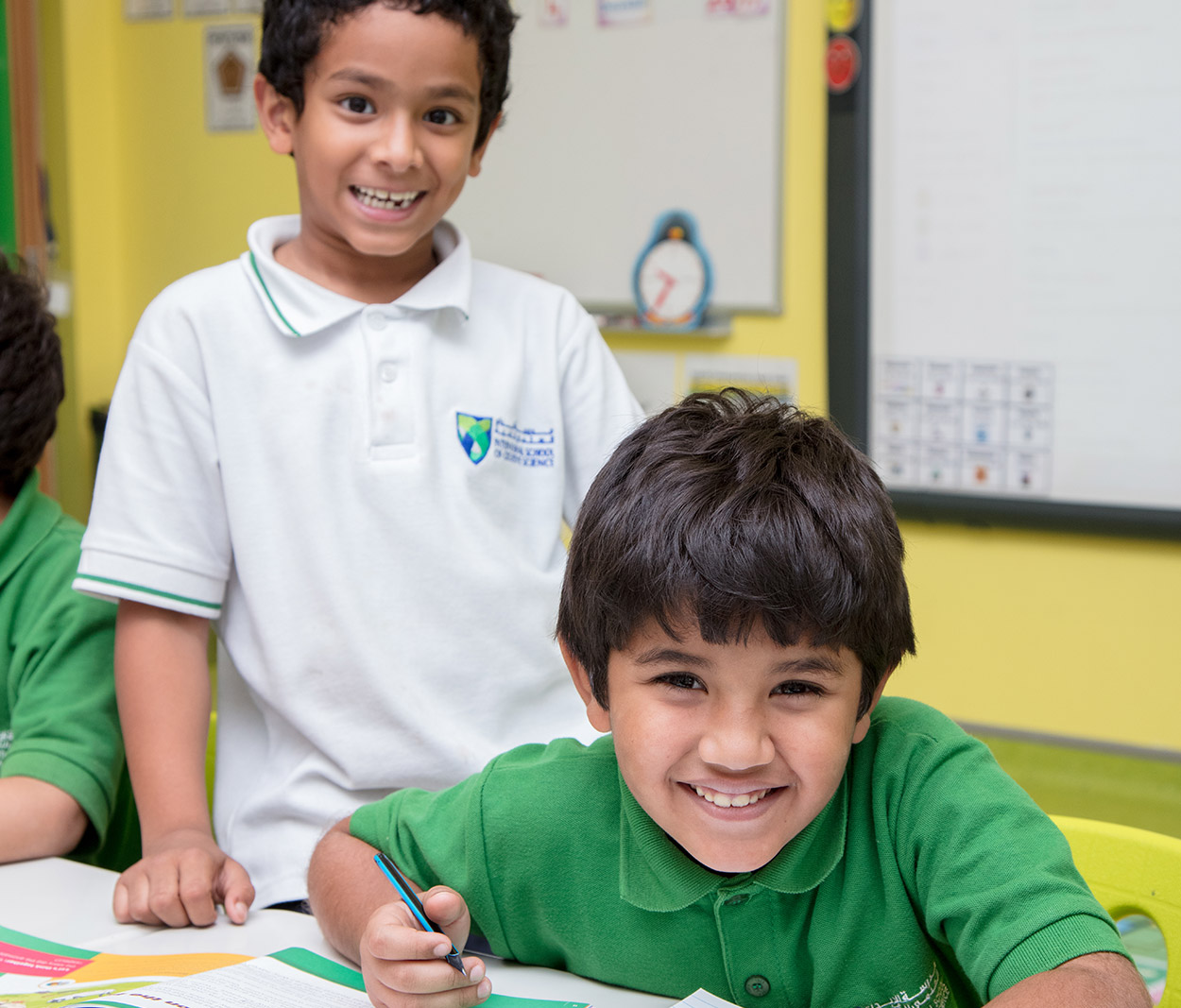
At ISCS Bahrain, we are committed to providing a challenging curriculum, with high expectations.
Students in the Primary phase follow the National curriculum of England, and through a rich, diverse and exciting curriculum, our students develop into well rounded, confident learners, pursuing ‘excellence’ in all that they do.
Students are instructed in the following academic subjects: English, Math, Science, Arabic Language, Islamic Education, History, Geography, Quran, Arts and Design, Physical Education, Topic, Computer Science & PSHE.
The study of English at ISCS is a bespoke programme of study which aims to support children in becoming confident speakers, balanced readers and to have the skills to write for specific purposes. At ISCS, we explicitly teach Speaking and Listening, Reading and Writing. Our principal aim is to develop children’s knowledge, skills and understanding in English and ensure that the children then transfer these skills into all subjects.
Our aim is to develop children’s communication, language and essential English skills. We ensure that they have the ability to listen, speak, read and write for a wide range of purposes, subsequently ensuring that they have the tools of language to learn and communicate ideas, views and feelings confidently. We believe that the ability to communicate gives children the capacity to participate more fully in their society and become skillful communicators. Working together with others leads to the wider development of social relations, which include friendship, empathy and sharing emotions. We encourage the children to express themselves creatively and imaginatively, as they become enthusiastic and critical readers of stories, poetry and drama, as well as non-fiction and media texts. Children gain an understanding of how language works by looking at its patterns, structures, features, and origins. Children use their knowledge, skills and understanding in speaking and writing across a range of different situations.
Speaking and Listening
Spoken Language underpins the development of Reading and Writing; therefore, our English Curriculum is designed to continually develop children’s confidence and competence in Speaking and Listening skills. We focus on developing the capacity to explain their understanding of books and other reading, to prepare their ideas before they write using the ‘Talk4Writing’ approach, as well as teaching them to understand and use the conventions for discussion and debate.
Reading
At ISCS, we are extremely proud of the way we teach Reading and are committed to developing ‘Balanced Readers’. The skills of reading are taught explicitly using our ‘ISCS Reading Strategies’ so that children can comprehend on three different levels. We have a wonderful bank of reading resources, online and physical, which support readers at all levels and reflect the international nature of our school. ISCS strives to promote a love of reading throughout the whole school, from FS1 to Year 13. Students are immersed in reading through ‘Silent Reading’ during form time, Shared Reading lessons, ‘Story-Telling time’ by the class teacher just before home time, and Library sessions.
Writing
In Writing, it is important that children are exposed to a wide range of different text types. Our aim at ISCS is to enable children to write with confidence, fluency, accuracy and meaning in narrative and non-fiction across a wide range of text types. We support children to increase their ability to use planning, drafting and editing to improve their work and the work of their peers. A balance of Modelled, Guided and Independent strategies are used to support and extend learning, focusing on grammar, spelling, vocabulary and sentence structure. This approach is highly supportive to all children, especially EAL and SEND. Writing is assessed regularly, and teachers effectively use assessment information to inform planning to ensure that children are always meeting their full potential.
Spelling
At ISCS, we are incredibly proud of our innovative approach to Spelling! We treat spelling as a problem-solving activity, not just a list of words to learn off by heart. We know that to be successful spellers, we need to learn four spellings knowledges. These are: phonological, visual, etymological and morphemic. These knowledges give our children the tools they need to learn how to spell practically any word! All of our children from Year 1 – Year 6 practice learning these spelling skills both in the classroom and at home as part of their Home Learning. All of our classrooms have specially designed ‘Word Windows’, which helps to make learning spellings fun and exciting.
Phonics (Key Stage 1)
Read Write Inc. is a popular phonics scheme in the UK. Like all phonics schemes, it teaches children the sounds in English, the letters that represent them, and how to form the letters when writing. Read Write Inc. Phonics includes reading books written using only the letters they have learnt at each level (and a small number of separately taught tricky words). The children will quickly feel confident and successful. Our children will be starting to read using the following procedure and be at one of these stages: Learning Set 1 Speed Sounds, Learning to Blend Set 1 Speed Sounds, Learning Set 2 Speed Sounds, Learning Set 3 Speed Sounds, Reading Books with Set 1, 2 and 3 Speed Sounds.
A high-quality Mathematics education provides a foundation for understanding the world, the ability to reason mathematically, an appreciation for the beauty and power of mathematics and a sense of enjoyment and curiosity about the subject.
ISCS teaches a bespoke curriculum. Using the Mathematics curriculum of England, tailored with the latest research of Mathematics Mastery, the focus is on securing a greater depth of understanding in the subject. The children are provided with opportunities to develop their ability to calculate fluently, to reason and solve problems through application of knowledge and transferable skills. Mathematics is essential to everyday life so real-life application is incorporated through cross curricular links, particularly with STEAM. This gives the children an opportunity to see purpose within Mathematics and use real-life examples to deepen their understanding and inform them of the necessity for mathematics in everyday life.
ISCS aims to provide more personalised opportunities for all children to achieve their potential. This is achieved through careful and thorough planning of the whole unit of work, as well as modelled teaching and differentiated activities. At ISCS, children are encouraged to take ownership of their learning by giving them the autonomy, together with teacher guidance, where necessary, to move through the learning activities at a challenging pace appropriate to their current level of understanding against the learning objective. Children work independently and collaboratively, in pairs and groups, which exposes all children to a higher level of vocabulary and reasoning and provides opportunities for children to be supported and to be supporters of their peers. Lessons are carefully planned, and questions differentiated using Bloom’s language of learning to develop higher order thinking skills and depth of understanding to ensure that tasks match individual needs.
The annual ISCS Math Day/ Numeracy Day celebrates the subject of mathematics and provides the children with an exciting opportunity to showcase their mathematical knowledge, skills and understanding within a different purposeful context. Children are also given the opportunity to represent ISCS in many regional, National and International Mathematics competitions.
At ISCS, we adopt a practical and applied approach towards learning in Science. Children are encouraged to believe they are thought-creators and investigators who explore, question, discover, discuss and explain concepts.
Science is taught as a specialist subject with dedicated Science lessons in class as well as in a bespoke, well-equipped Science Lab, through the implementation of the Pearson International Science scheme of learning. We aim to stimulate a child’s curiosity to gain an understanding of natural phenomena; thus, developing children’s scientific knowledge and an understanding of the world around them. Learning opportunities in Science allow children to develop reasoning and thinking skills to problem solve, communicate effectively, work cooperatively and use technology to become 21st Century learners. Children learn to ask scientific questions and begin to appreciate the way science will affect their future on a personal, national and global level. The aims of the National Curriculum for Science are to enable children to:
- ask and answer scientific questions
- make predictions
- develop skills through scientific enquiry and planned investigations
- use appropriate scientific equipment to aid enquiry, including technology
- evaluate evidence
- present their conclusions clearly and accurately
- know and understand the life processes of living things
- know and understand materials and their properties
- know and understand the physical processes of materials, electricity, light, sound and natural forces
- know about the nature of the solar system, including the earth
- understand current world issues such as Global Warming/Environmental changes, including recycling and how to reduce their carbon footprint
At ISCS, we see Art as a driver of creativity, inspiration and imagination. We ensure that our pupils are able to communicate what they see, feel and understand through experimentation of colour and technique. We weave art through the curriculum; whether it be through responding to art in English or collaborating our knowledge in Conceptual Learning, allowing our students the opportunities to bring our concepts to life. Self-evaluation of work is fundamental to our pupils’ development and is encouraged throughout. We have the use of sketchbooks to record and develop ideas in order to show the progression of our children’s artistic ability. We have also developed our STEAM provision through the introduction of digital art to inspire and provide a fresh approach to art.
Children’s work is celebrated and recognised in our very own year group galleries for parents and children alike to view and hopefully be inspired by others. Best pieces of Art are recognised in our Annual International ISCS Art competitions and galleries.
At ISCS, we aim to ensure children acquire a comprehensive and coherent understanding of the history of the wider world. We wish to encourage a sense of curiosity and a desire to learn more about the past. In order to achieve this, our curriculum is purposefully sequenced in chronological order, allowing children to form coherent historical narratives throughout their time at ISCS. Our curriculum is knowledge and vocabulary rich, enabling children to answer an overarching enquiry question related to each unit of work. Local history is integral within our curriculum, providing the children with an understanding about their local heritage.
Alongside the development of substantive knowledge, children will develop their disciplinary knowledge as they learn the fundamental elements of what it is to be a historian. Throughout our curriculum, historical concepts are woven throughout and provide children with the first stepping stones to ‘thinking like a historian’. These are:
- Similarity and Difference
- Change and Continuity
- Cause and Consequence
- Chronological Understanding
- Recognition of Defining Characteristics
- Sources and Evidence / Historical Interpretation
We purposefully plan to enrich learning through the provision of authentic experiences such as the handling of artefacts, educational visits, visits from experts and exploring a range of historical sources.
The study of Geography enables children to understand their immediate surroundings, the wider world and to help them make sense of it. Through the teaching of geography, children at ISCS are encouraged to analyse the world around them from a physical and a human perspective and to appreciate the interdependence of the physical environment and human development. At ISCS, our children are prepared for a life where they will live and work with a variety of people. We believe that geography can help pupils develop tolerant attitudes to different cultures. Through the teaching of Geography, we aim to:
- provide a range of experiences from which the children can develop the relevant geographical skills, knowledge and understanding.
- encourage and develop the children’s interest in the wider world through firsthand experience and the complementary use of secondary sources.
- develop children’s sense of identity, within both local and wider perspectives, thus enhancing their understanding and sensitivity towards the Earth and its peoples.
We appreciate that children need to develop a series of geographical skills in order to help them make sense of the world around them. These include being able to:
- make, read and interpret maps
- use and interpret globes and atlases
- use a range of fieldwork techniques
- follow a line of enquiry, such as asking the right questions, drawing conclusions and communicating findings
- identify features that give a place its identity
- use ICT to gain access to information and to assist in handling evidence and data
At ISCS, we are committed to educating our pupils as global citizens who are conscious-minded of the world around them, understand others, and work towards making the entire globe a better place. ISCS Geographers have knowledge of weather patterns and climate changes on areas of land. They study how these changes have affected humans and sharing this knowledge with others to hopefully bring an understanding and global awareness of the effects of climate change on human society.
‘Topic’ at ISCS involves the study of thematic cross-curricular half-termly topics linking History, Geography, Art and Design, Computing and Science, to allow students to explore subject matter at greater depth and to make better connections between different areas of learning. Studying a main ‘topic’ each Half Term (with a longer one at the end of the year) really enables children to develop a better understanding of what they are learning and allows them to have more fun doing it. Whilst discrete subjects certainly still have their place, every class in ISCS learns cross-curricular topics over an extended period of time. This provides a deeper understanding of the content being taught and allows students to transfer what they have learnt from one subject to the next. It is more child-centred, skills-focused and allows for more creativity in the classroom. A few topics our ISCS students may cover include The Great Fire of London, Weather, Oceans and Seas, Early Islamic Civilization, Early Advanced Civilizations, Natural Disasters, Rainforests or The Romans.
Physical Education and Sports are central to the educational programme at ISCS. We seek to educate the whole child and Physical Education forms an integral part of the whole school curriculum. It allows students to develop physically, socially, emotionally and cognitively. They learn to work as part of a team, to recognize the abilities of others and to have an enjoyable learning experience.
Physical Education at ISCS aims to help children to:
- Develop confidence and ability in a range of physical skills and activities in an exciting, safe and enjoyable environment
- Learn to co-operate and work with others in group and team situations
- Gain an understanding of the role that Physical Education has on their health, wellbeing and lifestyle
- Develop an understanding of fair play and to accept winning and defeat with equal dignity
- Promote sports and activity as a healthy and enjoyable pastime and encourage participation in physical activity both within and outside of school.
The Physical Education department is very well-resourced and the school’s facilities include a swimming pool, a state of the art 3G Astro-turf all-weather pitch, tennis courts, basketball/ netball courts, a fitness suite/ gymnasium and a large additional indoor Sports Hall. The Physical Education department comprises of highly-qualified specialist staff with extensive knowledge and skills across the curriculum.
Physical Education fits well into the whole structure of sport at ISCS, providing foundations and confidence for children of all abilities to pursue their chosen sports through the extensive Extra-Curricular Activities (ECA) Programme. This includes a wide range of sporting ECA’s, which are open to all, and a wide range of competitive sports squads. Many children within the squad programme have the opportunity to compete with other schools from across the region at prestigious events held in Bahrain, the Middle East Unity Cup and the ISCS Sports Series.
Teaching and learning the Arabic language holds an integral place at ISCS. We aim to enable each student to develop a good understanding of the language, eventually being able to speak and write it fluently.
During Arabic lessons in Foundation Stage, children are exposed to the sounds and letters in Arabic through song and rhyme and other fun continuous provision activities, all of which are aimed at developing early language skills in Arabic. Naturally, children really enjoy learning and singing songs and have fun doing rhythmic activities while reciting rhymes.
For Arabic Education, we teach Arabic for Arabic Speakers (Arabic A) and Arabic for Non-Arabic Speakers (Arabic B). At ISCS, there are dedicated Arabic teaching rooms for the Arabic B students to learn in and an additional room for enrichment. Arabic A students are taught in their classroom. During the year, the children celebrate many different occasions, for example National Day and Arabic assemblies, which are integrated into the Arabic teaching. To enhance the children’s ability to understand, we utilise different teaching methods such as playing Arabic games, drama, art and crafts, projects and presentations for our students to complete. To assist learning, Arabic stories are used to teach children the language using books, the Internet, iPads and smart boards.
The vision of Islamic education presented at ISCS makes a fundamental distinction between teaching about "Islam" and teaching about "being Muslim." The goal of Islamic education is not to simply fill students’ minds with information about Islam, but rather to teach them about being a righteous Muslim.
Through their Islamic Education, children increase their knowledge of Islam using the stories of prophets and learn about such things as the manners of living a Muslim's life, the five pillars of Islam and Islamic faith and morals, enabling them to effectively apply them to their contemporary lives. Religious occasions such as Eid al-Fitr and Eid al-Adha are observed so that children realise their importance and value. A focus on Faith and Identity, Humanity and the universe is also built into the curriculum to ensure a foundation for well-rounded and responsible world citizens. A key feature of the curriculum is intended to build student understanding, appreciation and respect of the role Islam holds in the society.
ISCS is unique in its implementation of the study of the Quran for its students. The aim of the Quran department at ISCS is to instil Islamic values and ethics based on the teachings of the Holy Quran, which will guide our students in every aspect of their educational and personal lives. The school understands that high academic performance must go hand-in-hand with Islamic learning. Our students can make big-picture connections between topics they learn in class and the real-life Quranic teachings that apply to them. The study of the Holy Quran and the values it imparts are beneficial to children, not only as a subject, but also as a source of moral guidance.
Students learn Tajweed, as well as undertake a unique bespoke Hifz programme, while learning the many duas mentioned in the Quran and Sunnah. Students excelling in their Quranic studies have the opportunity to recite to Sheikh Salah Bukhatir and participate in the ISCS Quran Competition.
The world we live in is rapidly changing due, in a large part, to changes in technology. The way we communicate, gather news and information and even the jobs that are available have been transformed over the past decade. At ISCS teaching pupils to use online technologies safely is of paramount importance and is a fundamental component of our Computing curriculum. Computing skills are a major factor in enabling children to be confident and we focus on using software tools, designing computer games and exploring real world control systems, which enables pupils to experience coding, programming and de-bugging/problem solving.
Additionally, we take a cross-curricular approach to develop and enhance Information Communication Technology (ICT) skills necessary for children to be able to use and explore digital information, research, media, publishing and presentation in a discerning and effective way to empower them to become creative and independent learners.
Through teaching computing and ICT skills, we will equip children to participate actively and safely, using a range of equipment and resources, in an ever-changing world increasingly transformed by technology.
Planning is derived following Pearson Computing Scheme of Work which includes half termly units of work. The units follow the themes of Using Technology Safely, Coding and Programming, Computer Games and Real World Technology. Resources are planned to ensure safe and suitable content. Termly consultant support is used to make sure that the planning and content remains current, relevant and appropriate.
The ISCS PSHE programme is a whole school approach to teaching PSHE - Personal, Social, Health and Economic Education. It covers a range of topics throughout the year, which the whole school focuses on at the same time. A few topics are Global Citizenship, Health and Wellbeing, Economic Wellbeing and maintaining Positive Relationships with those around them. ISCS also teaches some basic tools for helping the children to be calm and focused. There is considerable research evidence that Social Emotional Learning (SEL) improves students' social development and mental health but also can strengthen their academic achievement. Our weekly assemblies are a good way to foster positive character development while developing the culture of the school. Some of our assemblies are used to introduce new units from the Jigsaw program. They also have a Virtues focus, Hadith of the Week, student participation/ presentations, celebratory work, and Golden Tickets and Virtues awards.
Learning in the Primary phase at ISCS encourages all children to ask questions. Therefore, critical thinking and problem solving are integral to our teaching strategy, as it is through this approach that we instil a zest for learning.
Throughout Primary, links are made across the curriculum to ensure students are taught through a holistic methodology, which recognizes that the learning experience is greatly enriched when subjects are not taught in isolation.
Key Stage 1 (Years 1 and 2)
Key Stage 1 is an important bridge between the Foundation Stage, and the more rigorous content taught in Key Stage 2. We ensure students are equipped with a strong foundation, to ensure a smooth transition into Key Stage 2. Phonics and Mathematics are provided daily, to enhance students’ reading, writing, and problem-solving skills.
Key Stage 2 (Years 3 to 6)
In Key Stage 2, our students explore subjects in more detail, allowing them to extend their learning. The development of leadership and independent learning skills are an integral part of the learning modules, for students of Years 3 to 6.
As students’ progress throughout Key Stage 2, we ensure that they are adequately prepared by the end of Year 6, for the best possible transition to our Secondary school.
Content Delivery
At ISCS Bahrain, our course delivery practice is rooted in globally recognised teaching strategies and best practices, all geared towards achieving several key objectives:
- Fostering a Lifelong Love for Learning: We strive to ignite and sustain students' interests, enabling them to unlock their full potential.
- Holistic Development through Purposeful Play: At the Foundation Stage, we employ purposeful play strategies to ensure the comprehensive growth of children, encompassing cognitive, social, emotional, and physical aspects.
- Nurturing Confidence and Independence: Our approach aims to cultivate self-confidence and self-awareness, empowering students to take charge of their own learning journey.
- Building a Strong Knowledge Foundation: We lay a robust groundwork in core subjects like Language Arts, Mathematics, Social Studies, and Science. This is achieved through an enriched cross-curricular approach that seamlessly integrates Art, Physical Education, and Information and Communication Technology (ICT). This holistic learning experience ensures a well-rounded education that goes beyond textbook knowledge.
Teachers
Teachers at ISCS play a pivotal role in the educational journey of our students. They are dedicated to:
- Unleashing Potential: Our educators celebrate diversity and work diligently to identify and nurture the unique strengths and capabilities of each student, allowing them to realise their full potential.
- Partnering with Parents: Open collaboration with parents is paramount. This active involvement ensures that parents can contribute effectively to their child's learning experience.
- Prioritising Safety and Values: Providing a safe and secure environment is of utmost importance. This environment is built upon our cherished culture, morals, and values, ensuring a nurturing space for all.
- Leveraging Technology for Engagement: Our teachers integrate cutting-edge technology to cater to diverse learning styles, sustaining high levels of enthusiasm among students.
- Encouraging Ongoing Assessment: Through regular feedback, our teachers foster a positive and secure learning atmosphere, enabling students to thrive and grow confidently.



